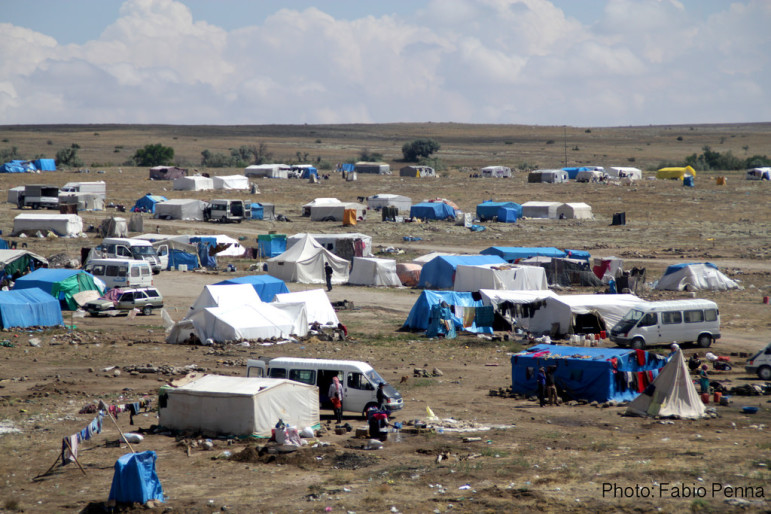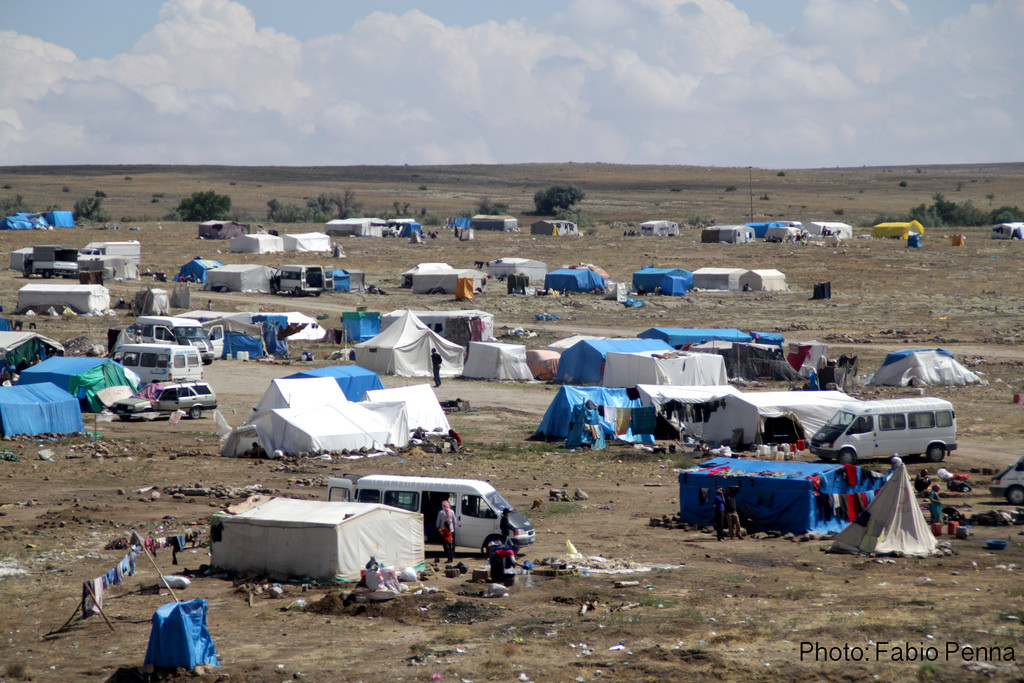Commentary by Richard Douglas

A Syrian refugee camp in Cappadocia, Turkey. Photo by Fabio Sola Penna with Flickr Creative Commons License
In the wake of the Paris terrorist attacks, Americans are more worried than ever about an attack on the United States. Their concerns are aggravated when they hear Washington debating the Visa Waiver Program, something most people had never heard of before. But it is critical to the security of our nation.
The Visa Waiver Program allows visa-free entry to our country. It is this critical process that is intertwined with the President’s stubborn insistence on resettlement of Syrian refugees in the U.S. To ensure Americans’ safety, Congress must engage.
Congress should retake control of the Visa Waiver Program legislatively. In doing so, it should designate Naval Station Guantanamo Bay as a temporary transit and vetting site for Syrians hoping to come to the U.S. Let’s look at how this would work, as it has in the past.
How visa waiver works
Citizens of Visa Waiver Program countries may enter the U.S. without a visa for up to 90 days. President Reagan signed the program into law in 1986.
For its first 14 years, Congress kept a tight rein on the program by requiring its reauthorization every two years. In 2000, Congress moved to make the VWP permanent, under pressure from President Bill Clinton’s State Department and the travel industry.
Some in Congress resisted, arguing that Congress should not permanently surrender its control over visa-free entry to our country to the Executive Branch. But Congress surrendered anyway, and the measure was approved during the year before 9/11. (N.B. None of the known 9/11 terrorists entered the U.S. on the Visa Waiver Program.)
Given the resurgence of Islamist terror, Congress must retake control of the VWP by legislatively re-imposing a two year re-authorization requirement on the program. Thus, the Visa Waiver Program would expire automatically unless the White House could persuade Congress that travelers to the U.S. were vetted properly before arrival here.
Severely restricting or outright repeal of the VWP today is not necessary. But making the VWP permanent in 2000 was unwise, because Congress surrendered enormous leverage over the agencies which control entry to the U.S.
Americans skeptical on immigration
Reintroducing congressional control will send the State Department and the travel industry into orbit. But two-year review of the Visa Waiver Program is reasonable, given justifiable American skepticism about the Administration’s competence.
Many ask whether Syrians should be admitted to the U.S. as refugees, as Russian munitions rain down on their villages. Thanks to weakness in the White House, four million Syrians are homeless. Hidden among the waves of innocent Syrian refugees are murderers like those responsible for the Paris attacks. Yet President Obama insists we accept thousands of Syrians now.
The president ignores the fact that U.S. immigration systems have been so badly damaged by his own lawlessness that Americans do not trust the Department of Homeland Security (DHS) to vet anyone. Indeed, DHS can hardly manage its internal paper flow, much less migrant flows into our nation. Thus, for the first time in sixty years, the international refugee resettlement regime could be in danger owing to White House stubbornness verging on incompetence.
Guantanamo as a refuge
American sailors and marines have inhabited Guantanamo since 1903. Today Americans associate it with battlefield detainees from Iraq and Afghanistan.
But the massive Guantanamo naval base has also been a place of refuge. In the 1990s, Cuban and Haitian refugees were housed there to await asylum processing. Syrians bound for the US could also be housed there voluntarily and temporarily to permit methodical vetting by US agencies.
The temporary infrastructure needed could be built quickly. A good model is the resettlement facility in Damak, Nepal, where the International Organization for Migration (IOM) processed tens of thousands of ethnic Nepalis, driven from Bhutan, for U.S. resettlement. A similar facility at Guantanamo could be operated by IOM, whose director general in Switzerland is a retired senior U.S. Foreign Service officer.
Guantanamo access could also be afforded to the International Red Crescent Society and national refugee resettlement agencies of any nation willing to consider resettling Syrians housed temporarily at the naval base. U.S. vetting agencies are already on hand in Guantanamo. Prior to resettlement, any Syrian refugee desiring to leave Guantanamo and return to Syria or a third country could do so freely. Syrians would be asylees, not detainees.
Failure of presidential leadership
Concern about the Visa Waiver Program and Syrian refugee crisis are symptoms of a larger ailment: a failure of leadership in the Oval Office. After President Obama’s departure, our nation will urgently require a new national security strategy. Seven years of the “transformational” Obama Administration have weakened America’s position in the world.
A new overarching strategy is required with at least two major components: recovery of lost ground in critical areas (e.g., friendship with Israel, sea and land-based ballistic missile defense, resistance to Iranian expansion, and border security), and a new national security vision which matches adequate resources with American national security objectives.
Without a strategy and clear vision for the future, we will continue the ad hoc lurching from crisis to crisis which has killed tens of thousands in Syria, and characterized Obama Administration national security policy. This cannot continue. It will end only when a new President takes office. Thankfully, that day is approaching quickly.
On 9/11, Richard Douglas, Republican U.S. Senate candidate in Maryland, was chief counsel of the Senate Foreign Relations Committee. He was general counsel at the Senate Intelligence Committee while the U.S. intelligence community carried out major anti-terrorism operations in Afghanistan. He is a former Deputy Assistant Secretary of Defense and an Iraq war veteran.







When I saw the draft which was of 7159 dollars, I accept that my friend’s brother was like really generating cash in his spare time with his computer. . His aunts neighbor has done this for only 10 months and by now repaid the loan on their home and bought a new Car .This is what they are donig …
>>>>> Visit my ??????? for the site address
262
When I saw the draft which was of 7159 dollars, I accept that my friend’s brother was like really generating cash in his spare time with his computer. . His aunts neighbor has done this for only 10 months and by now repaid the loan on their home and bought a new Car .This is what they are donig …
>>>>> Visit my ??????? for the site address
133
That is a great move. Government need to be extra careful of accepting Syrians refuge.
https://www.youtube.com/channel/UCQPv1bohXysBCD7izp41uOQ